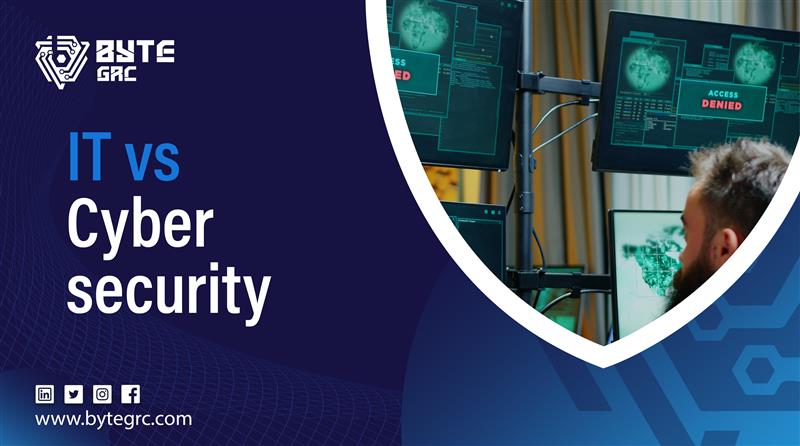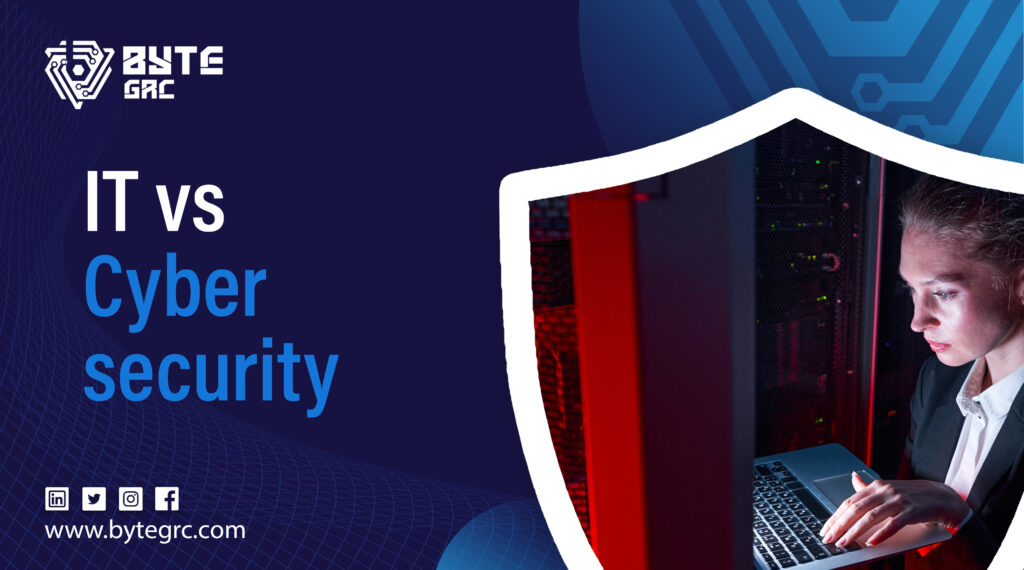|
Getting your Trinity Audio player ready...
|

Table of Contents
IT vs Cybersecurity Jobs: How Are They Different?
According to Statista, nearly 70 percent of global respondents claim that they feel more vulnerable to identity theft now than they did years ago.
As we look around, we clearly notice that our world relies on technology, and the business world is no exception, from computers to the internet, which allows business professionals to complete their tasks and to achieve their business goals.
These huge amounts of technological advancement and usage create high demands for informational technology (IT) experts. As the BLS predicts, an average of 377,500 job openings will be expected by the year 2032.
Technology positions in business fall into various categories; two of the most significant are IT and cybersecurity. While IT and cybersecurity share some similarities, they are different in significant aspects. In this blog, we compare IT vs cybersecurity, and the educational courses, and potential careers can be helpful.
What is Information Technology (IT)?
Information Technology (IT) is a vast field that fuses all of the devices and technology that can process, store, and share electronic data from one place to another. These devices range from computers to self-driving vehicles. Hence, the professionals who are responsible for managing and maintaining these systems are known as IT professionals.
In business, IT professionals handle administrative tasks such as training system users. These experts also offer external and internal support when any device malfunctions. In addition, they work day-to-day to ensure that the company remains working within industrial regulations.
What is Cybersecurity?
Cybersecurity is a specialist sector of IT. Professionals working in the cybersecurity industry largely focus on protecting networks from cyber attacks and storing data from cybercriminals and other unauthorized users. They also proactively monitor for system vulnerabilities that could potentially be exploited by disruptive agents. This can mitigate the chances of data breaches as well as serious malware-driven issues like ransomware.
Data protection can include a wide range of areas. In business, it could apply to sensitive financial assets. In health care, it could be related to confidential patient records. The devices that cybersecurity experts protect continue to expand in complexity due to the increased use of new technologies such as cloud-based solutions.
IT vs Cybersecurity Jobs: Common Similarities
Before discussing the difference between IT vs cybersecurity jobs, let’s explore some similarities they share.
IT and cybersecurity professionals are heavily involved in the creation of their companies’ technology-based strategy, and their participation is critical to the organization’s computer systems or networks remaining optimized. One important aspect of their job is to keep the organization’s critical data secure and out of the hands of disruptive actors.
Individuals working in both areas must have some of the same abilities to succeed. Aside from a solid understanding of fundamental technical skills, they must be able to monitor the performance and uncover vulnerabilities in the organization’s computer systems or networks. They must also have strong problem-solving abilities to efficiently diagnose and handle any difficulties that arise.
Because of the rising emphasis on incorporating technological solutions into corporate plans, IT and cybersecurity experts can pursue careers in a variety of industries. Financial institutions, insurance businesses, health care organizations, and IT service providers are among the most common private sector employers of IT and cybersecurity experts. IT and cybersecurity specialists can work in a variety of government departments.
Comparing IT vs Cybersecurity Jobs: Differences
Since we understand the similarities between IT and cybersecurity jobs, let’s uncover their major differences:
The first and the biggest difference between IT vs cybersecurity jobs is the scope of study. IT is the broad field that focuses on an organization’s entire IT infrastructure. while cybersecurity only focuses on preventing the system from being breached by unwanted cyberattacks.
Another way to think about the difference between these two fields is related to the components they focus on. Professionals working in IT develop and support a company’s computer networks, systems, and applications. Those working in cybersecurity are more concerned with the digital information that’s entered and stored within these elements.
Jobs in each field require certain competencies that are unique to the field as well. IT professionals typically possess sharp leadership, project management, and resourcefulness skills, whereas cybersecurity professionals commonly have a keen understanding of risk management, are good at thinking strategically, and are detail-oriented.

IT vs Cybersecurity Jobs: Table of Comparison
IT Jobs | Cybersecurity Jobs | |
Focus | Supporting computer systems, networks, and applications | Protecting cyber information, assets, and networks from cyberattacks |
Required Skills | Communication, project management, problem-solving, coding, computer networks, hardware and infrastructure | Problem-solving, preventative measures, incident response, risk management, system evaluation |
Preferred Education | A bachelor’s degree is required; a master’s can be helpful or necessary to advance to some higher roles. | Bachelor’s degree required; master’s can be helpful or necessary to advance to some higher roles. |
Useful Certification | CompTIA IT Fundamentals Certified Data Professional Certified Information Technology Manager | CompTIA Security+ Certified in Risk and Information Systems Control Certified Information Security Manager |
Common Employers | Software and hardware companies, finance and insurance, healthcare, IT service providers, retailers, and government agencies | Government agencies, finance and insurance, healthcare, and IT service providers |
Job Titles | Software developer, computer programmer, IT director | Information security analyst, cybersecurity director, penetration tester, security architect, cryptography engineer, cloud security |
IT vs Cybersecurity Jobs: Career Paths
While the IT and cybersecurity fields each have different possible career paths.
Important IT roles:
- IT Technician: Analyze and diagnose computer problems, usually in coordination with support experts
- Web Developer: Create and manage an organization’s website, including its functionality.
- Systems Analyst: Analyze a system’s design to spot inefficiencies and suggest simplifying resolutions
Major Cybersecurity roles:
- Data Security Analyst: Look after the firm’s computer networks, preventing possible cybersecurity threats
- Network Security Engineer: Design and govern various security features within an organization’s network, such as firewalls or VPN
- Penetration Tester: Assist security tests on an association’s tech-based systems to identify vulnerabilities
Transitioning From an IT Job To a Cybersecurity Job
Cybersecurity’s emphasis on proactively preventing cyber threats may make it an appealing topic for existing IT workers to pursue. Individuals can take two steps to completely prepare themselves for a job in cybersecurity.
Step 1: Get an advanced degree.
While a bachelor’s degree is the basic requirement for IT and cybersecurity positions, obtaining an additional degree, such as a Master of Science in Cyber Security, can expand an individual’s cybersecurity knowledge and skill set. This can assist in preparing the individual for the responsibilities and activities of a cybersecurity career, making the move from one profession to another smoother. Furthermore, an advanced degree may lead to more opportunities, as some firms may require an advanced degree for specific cybersecurity tasks.
Step 2: Get Cybersecurity Certification.
Seeking a cybersecurity certification can help an individual hone their skills in a specific area of cybersecurity. This could perhaps prepare students to pursue the roles that best suit their interests. Certifications include the Certified Ethical Hacker (CEH), Certified Information Systems Auditor (CISA), Certified Cloud Security Professional (CCSP), and GIAC Certified Intrusion Analyst (GCIA).
Conclusion
Choosing between IT vs cybersecurity jobs is depends upon the field of your interest. Professionals in both areas share the common goal of supporting their companies to maintain technology systems that work on efficiency, security, and safety. As the business leans further into tech-obsessive solutions to company problems, these professionals will remain vital to their organizations’ success.
